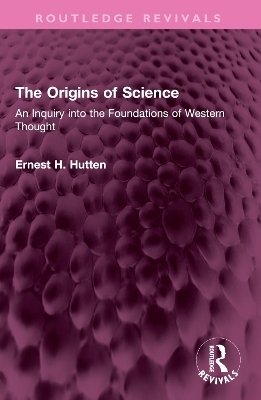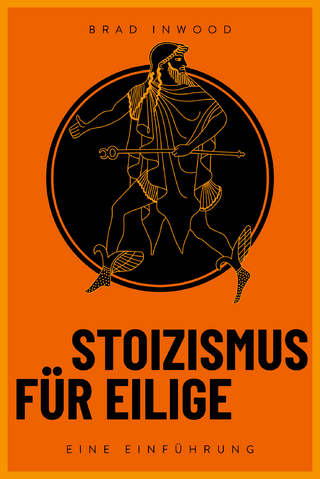
The Origins of Science
An Inquiry into the Foundations of Western Thought
Seiten
2024
Routledge (Verlag)
978-1-032-36748-4 (ISBN)
Routledge (Verlag)
978-1-032-36748-4 (ISBN)
First published in 1962 The Origins of Science tries to explain scientific thought from its historical and psychological origins. Author argues that scientific method is the intellectual safeguard for the criteria of truth and reality. Instead of traditional induction, the creative view of scientific activity must be accepted.
First published in 1962 The Origins of Science tries to explain scientific thought from its historical and psychological origins. The depth of psychology of today rather than traditional epistemology is needed in order to understand the problems of knowledge. Reality is the first problem of the scientist; it is exemplified by the idea of object, or of matter. The development of this idea from its Greek beginnings is traced and the unconscious mechanisms that underlie our thought processes -of abstraction, generalisation, etc.- are made manifest. The second problem is that of truth; it is illustrated by examples from the history of mathematics and of logic. Again, the ‘psychology’ of what we accept as truth is made explicit. Scientific method is the intellectual safeguard for the criteria of truth and reality. Instead of traditional induction, the creative view of scientific activity must be accepted. This book is a must read for scholars and researchers of philosophy of science and philosophy in general.
First published in 1962 The Origins of Science tries to explain scientific thought from its historical and psychological origins. The depth of psychology of today rather than traditional epistemology is needed in order to understand the problems of knowledge. Reality is the first problem of the scientist; it is exemplified by the idea of object, or of matter. The development of this idea from its Greek beginnings is traced and the unconscious mechanisms that underlie our thought processes -of abstraction, generalisation, etc.- are made manifest. The second problem is that of truth; it is illustrated by examples from the history of mathematics and of logic. Again, the ‘psychology’ of what we accept as truth is made explicit. Scientific method is the intellectual safeguard for the criteria of truth and reality. Instead of traditional induction, the creative view of scientific activity must be accepted. This book is a must read for scholars and researchers of philosophy of science and philosophy in general.
Preface Part I: The Scientific Attitude 1. The Origins of Science 2. The Ideal of Rationality 3. On the History of Philosophy 4. On the Problem of Knowledge 5. Philosophical Theories of Knowledge Part II: Science and the Criterion for Reality 6. Ontology: The Search for an Object- the Atom 7. Causality: Law and Order Part III: Logic and Truth Criterion 8. Criteria for Truth and Reality 9. The Formal Use of Symbols 10. The Concept of Number 11. The Deductive System 12. The Rules of Deduction 13. Contradiction and Truth 14. Theories of Truth Part IV: Science as Creative Activity 15. Scientific Method 16. The Freedom of Science 17. Conclusion Selected Bibliography Index
| Erscheinungsdatum | 02.11.2024 |
|---|---|
| Reihe/Serie | Routledge Revivals |
| Verlagsort | London |
| Sprache | englisch |
| Maße | 156 x 234 mm |
| Gewicht | 450 g |
| Themenwelt | Geisteswissenschaften ► Philosophie |
| Naturwissenschaften | |
| ISBN-10 | 1-032-36748-2 / 1032367482 |
| ISBN-13 | 978-1-032-36748-4 / 9781032367484 |
| Zustand | Neuware |
| Informationen gemäß Produktsicherheitsverordnung (GPSR) | |
| Haben Sie eine Frage zum Produkt? |
Mehr entdecken
aus dem Bereich
aus dem Bereich
wie Philosophie uns helfen kann, unseren Weg zu finden
Buch | Hardcover (2023)
dtv Verlagsgesellschaft
CHF 39,90


